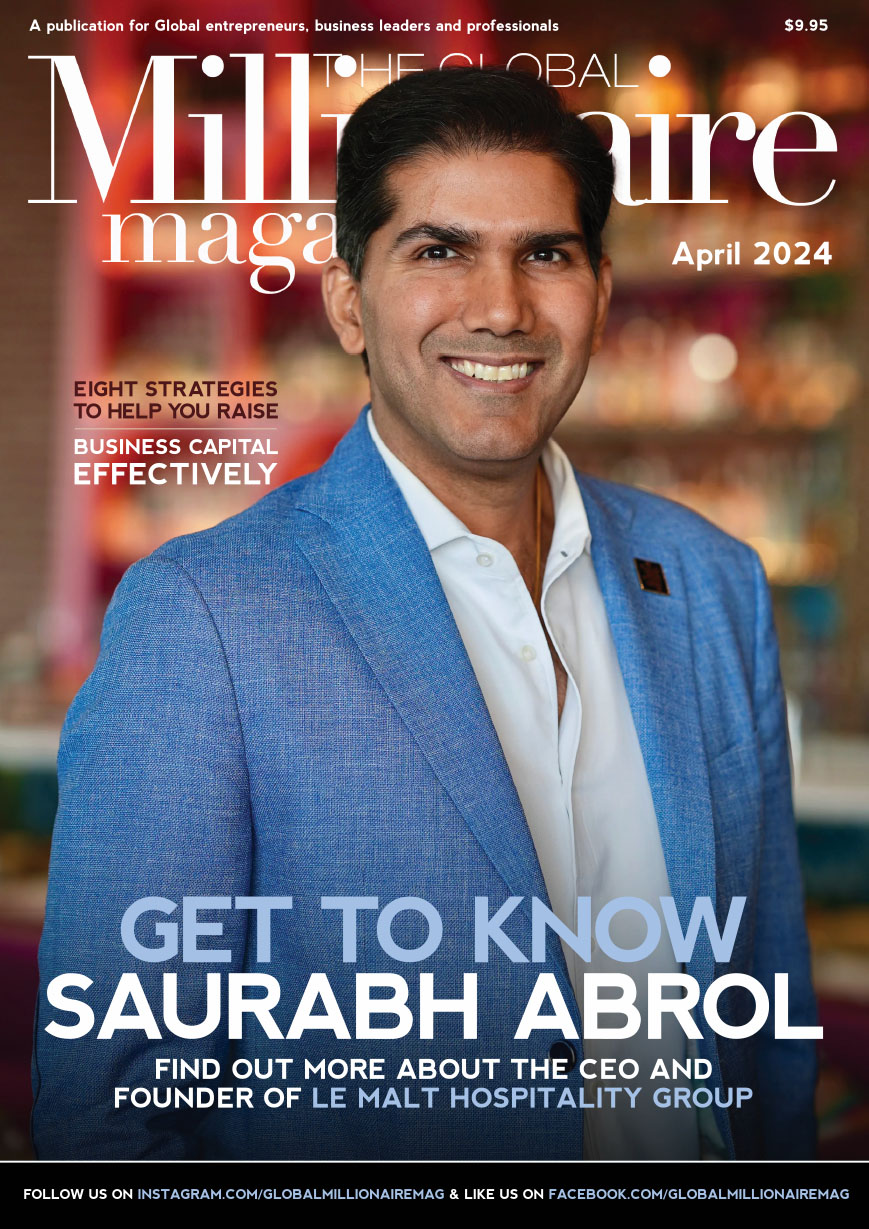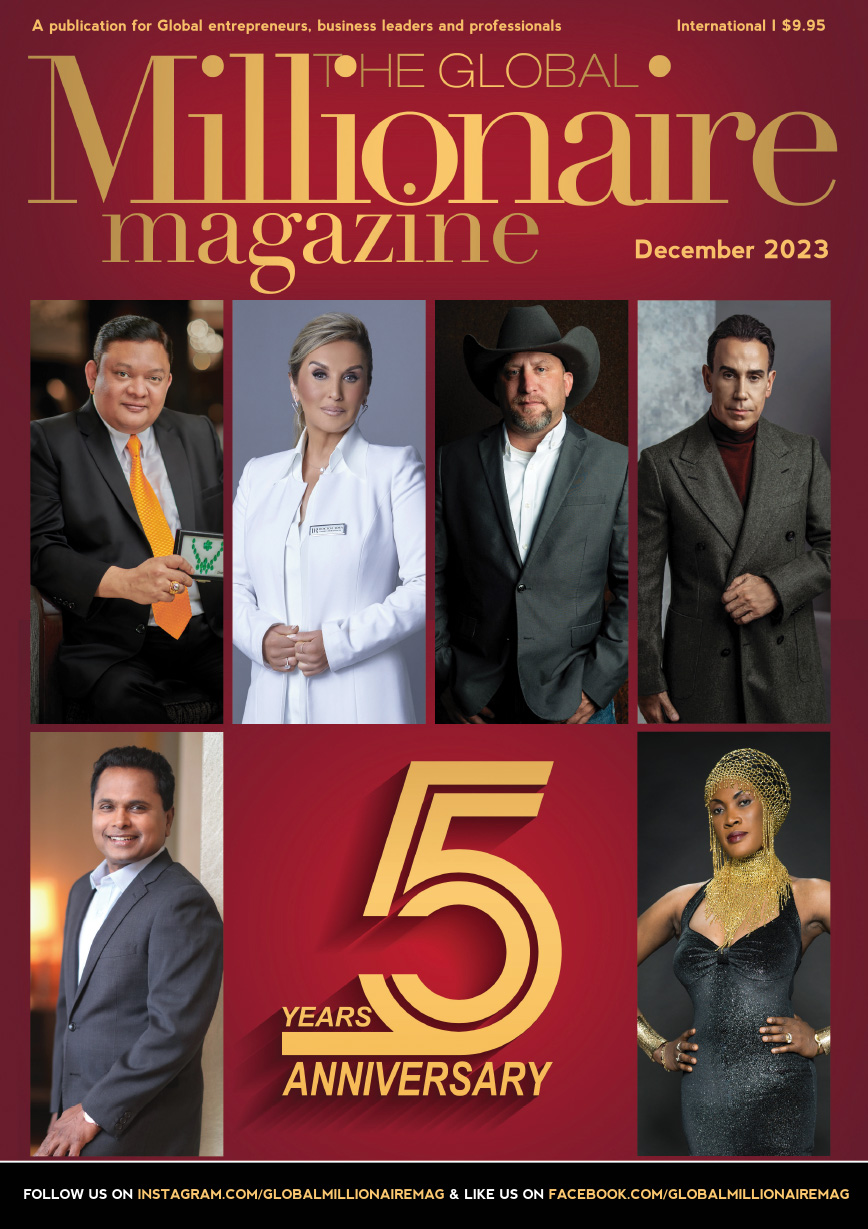
Download Now
In the bustling world of hospitality, where success is often measured by innovation, resilience, and a relentless pursuit of excellence, one name stands out: Saurabh Abrol. As the CEO and Founder of Le Malt Hospitality Group, Abrol has not only carved a niche for himself but has also etched an inspiring saga of triumph against all odds.
Abrol’s journey traces back to the early 1990s when his family migrated to the United States in pursuit of the American Dream. Settling into their new life was far from easy. At just ten years old, Abrol found himself grappling with a foreign language, cultural differences, and relentless bullying. Yet, amid the adversity, he found solace in his family’s unwavering support and a burning desire to defy the odds.
Abrol’s father, a cornerstone of inspiration, ignited the spark that would shape his son’s future. Over two decades ago, he introduced Abrol to the intricacies of the alcohol retail and wholesale business. Fuelled by passion and keen business acumen, Abrol swiftly ascended the ranks, eventually assuming the role of CEO at Wine Chateau in 2002.
In 2012, Abrol embarked on a new chapter by founding Le Malt Hospitality Group, a testament to his entrepreneurial spirit and vision. With an initial foothold in New Jersey and New York, the group quickly gained traction, offering a diverse portfolio of brands, including Le Malt Lounge, Le Malt Royale, Le Malt Imperiale, Meximodo, and Wine Chateau.
Abrol’s exemplary leadership hasn’t gone unnoticed. He’s been recognized as one of the Outstanding 50 Asian Americans in Business. He received accolades from Market Watch Leaders, earned the prestigious Ernst & Young Entrepreneur of The Year award, and was celebrated by R&R Marketing Achievement and the Rothman Institute of Entrepreneurship.
With a keen eye for opportunity and a drive for excellence, Abrol envisions taking Le Malt Hospitality Group to unprecedented heights. With nearly $75M in revenue and a strategic roadmap for expansion, the company is poised to become a global powerhouse in the hospitality sector.
For Abrol, success isn’t just about business; it’s about creating a lasting legacy for his family and future generations. As a father of two daughters, he’s determined to leave behind a blueprint for immigrant success and inspire others to overcome obstacles with grit and determination.
In a recent conversation with Global Millionaire magazine, Abrol shared insights into his remarkable journey, reflecting on the challenges he’s faced and the milestones he’s achieved. Through his unwavering commitment to excellence and relentless pursuit of his dreams, Saurabh Abrol continues to redefine success, one innovative venture at a time.

What inspired you to start your business or become involved in this industry?
My father played a very important role in inspiring me to get involved in the alcohol retail and wholesale business over 25 years ago. I love this business, so I saw an opportunity to grow the hospitality sector in 2012. With hard work and dedication to growing many upcoming locations around the country, we are on the verge of generating almost $75M in revenue.
What challenges or obstacles have you faced in your career or business, and how have you overcome them?
Running a hospitality business comes with numerous challenges and obstacles. Here are some that I’ve faced over my 25 years of experience:
1. Intense Competition: The hospitality industry is highly competitive, and attracting customers can be challenging. To overcome this, you must focus on creating a unique value proposition and providing exceptional customer service. You have to differentiate your restaurant by offering a specific cuisine, incorporating innovative menu items, or creating a cozy ambiance.
2. Staffing Issues: Finding and retaining skilled and reliable staff can be a recurring challenge in the restaurant industry. To address this, you have to implement effective recruitment and training processes to ensure you hire qualified individuals who align with your business values and culture. Additionally, offering competitive wages, employee benefits, and a positive work environment has helped retain staff members.
3. Fluctuating Food Costs: Food costs can be unpredictable due to market fluctuations, seasonal variations, and supply chain disruptions. Overcoming this challenge has involved establishing strong relationships with suppliers, negotiating favorable pricing and contracts, and regularly reviewing and adjusting your menu to accommodate cost fluctuations without compromising quality.
4. Changing Consumer Preferences: Consumer preferences and dining trends evolve over time, and it’s crucial to stay ahead of the curve. We’ve overcome challenges by conducting market research, analyzing customer feedback, and adapting our menu and offerings accordingly. Incorporating healthier options, catering to dietary restrictions, or embracing sustainability initiatives are some strategies we used to remain relevant.
5. Online Presence and Reputation Management: In today’s digital age, managing your online presence and reputation is crucial. We have faced challenges such as negative online reviews or maintaining an active social media presence. Overcoming these obstacles might have involved regularly monitoring and responding to online feedback, engaging with customers through social media platforms, and actively promoting positive reviews and testimonials.
6. Operational Efficiency: Ensuring smooth operations, maintaining quality standards, and managing costs can be demanding in a restaurant business. We have implemented efficient inventory management systems, streamlined processes, and utilized technology solutions like point-of-sale systems and reservation software. Regular staff training and communication have also contributed to our operational efficiency.
7. Financial Management: Managing finances, controlling costs, and maintaining profitability were essential for the long-term success of our business. Overcoming financial challenges involved creating detailed budgets, tracking expenses, optimizing pricing strategies, and seeking professional advice from accountants and financial consultants.
Challenges and obstacles are a blessing for any entrepreneur. They allow you to learn, pivot, and improve your company’s overall strategy. I’ve learned that you can’t pray to avoid the storm; you have to go through it and learn.

What sets you apart from others in your industry, and what unique perspective do you bring to this article?
At LMHG, we’ve been obsessed with customer service. Our raving customers who leave us excellent reviews online are our champions forever (Wine Chateau, Le Malt Lounge, Le Malt Royale). We’ve earned them as customers for life, and that is the main building block that makes us different. LMHG has never focused on a temporary concept that generates tremendous revenues in a short period of time but developed concepts that have been around for decades.
What are some notable career highlights?
We have received awards in the following categories:
1) Outstanding 50 Asian Americans in Business
2) Market Watch Leaders
3) Ernst & Young Entrepreneur of The Year
4) R&R Marketing Achievement
5) Rothman Institute of Entrepreneurship
Do you have any personal anecdotes, mantras, or stories to tell our readers?
I guess you can call this a cliché story or not, but when my family migrated to the States in 1990, I grew up with NOTHING. At ten years old, I had no friends in school, had a heavy English accent, and got bullied every day at school and on the bus. Growing up in a one-bedroom apartment with a family of four – I felt at the time that the only blessing was that my sister and my parents were close to me. That was the only comfort I had for many years. The hardships created a fire in me to work hard, learn, and be the person I envisioned as the CEO of my own hospitality company. You need to be incredibly uncomfortable to earn a comfortable life.

Where do you see yourself/your brand in a few years? What are some of your dreams and aspirations?
Our business has taken off like a rocket ship in the last few years. I clearly understand what is required to take this company to many levels higher than what it is currently. With this understanding, there is a clear path to creating a hospitality business with many of our concept locations around the world that can easily be a billion-dollar brand. Creating a legacy as an immigrant kid is something I strive to leave behind for my two daughters. That’s my biggest dream.
What pivotal lesson have you learned about achieving success in both life and business?
Success takes time, but hard work can start now. I’ve learned that your health is the most important aspect of your life, and taking care of it will give you a better mind, body, and soul. Those three things are vital ingredients to any business’ success.





























